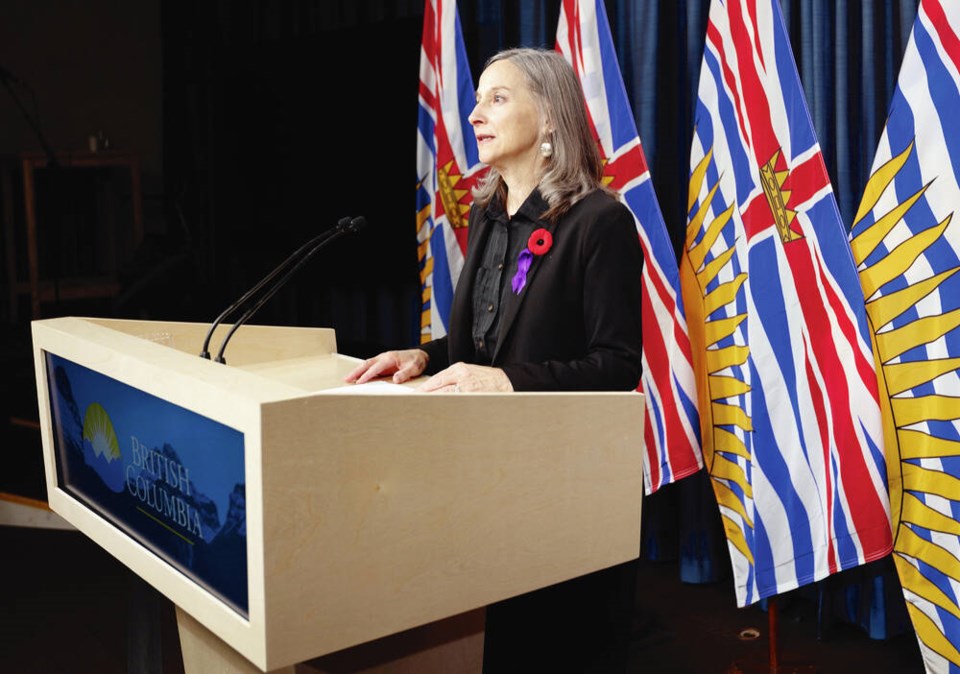B.C.’s Mental Health and Addictions minister says the province is not considering providing non-prescription opioids and stimulants to people addicted to drugs, which was recommended Wednesday as one way to help prevent overdose deaths.
A death review panel report on the overdose crisis, presented Wednesday by chief coroner Lisa Lapointe, recommends that community groups be allowed to hand out non-prescription drugs that have been determined not to be contaminated to people at risk of dying from street drugs.
The report was barely out when Whiteside responded that she “cannot accept” the primary recommendation of the panel’s report. “Non-prescription models for the delivery of pharmaceutical alternatives are not under consideration,” she said.
Lapointe called the minister’s response to the recommendation “disappointing.”
She said the researchers — a broad spectrum of addiction experts — gave their best advice on hard questions and she stands by their recommendation.
“If we don’t take their best advice, then the onus is on us as a province to sadly watch the death toll continue,” she said. “In the B.C. Coroners Service, our position is we do what we can to reduce death, period. We are always looking for measures to prevent deaths.”
The chief coroner acknowledged that offering access to controlled drugs to people already experiencing harm from drugs “can feel like a contradiction; I understand that.”
But the review panel report says the current medical model for provision of prescription safe-supply drugs — including hydromorphone, known as Dilaudid — faces a number of overwhelming challenges, including difficulties reaching large numbers of geographically disparate drug users.
Michael Egilson, chair of the the death review panel convened in December 2022, said non-medical models for distributing a safer supply are needed.
“Existing responses, initiatives and services, and their associated allocated resources, have not been commensurate with the urgency, magnitude and the scope of the crisis.”
The panel wants the Ministry of Mental Health and Addictions to apply to the federal government for an exemption to the Controlled Drugs and Substances Act to allow access to opioid and stimulant drugs without a prescription.
Egilson said if people are selling prescription Dilaudid to get money to buy the drugs they want, as has been suggested, the province should be looking at providing the types of drugs users are seeking.
The report said there’s an urgent need for a practical response to the crisis, one that meets the unique needs of people in communities that are rural and remote, or that lack the infrastructure .
More than 13,000 people have died of toxic drug poisonings since the overdose crisis was declared a public health emergency in 2016.
The death review panel report says about 225,000 people in B.C. use unregulated substances, but fewer than 5,000 people a month are given prescriptions to receive so-called safe-supply drugs.
“A fundamentally different approach is urgently required as incremental increases of existing interventions are unlikely to make a meaningful population difference and people will continue to die at unprecedented rates,” the report said.
The recommendations were hard for some to swallow.
BC United MLA Elenore Sturko said in a media scrum in the halls of the B.C. legislature that her caucus “rejects the premise of non-medically-supervised so-called safe supply.”
Sturko said drug addiction needs to continue to be addressed as a serious medical condition and there is a role for pharmaceutical alternatives to street drugs, such as opioid agonist therapies, to allow drug users to stabilize and look towards treatment.
Sturko said the province needs to take a very measured approach, given the impact on the community.
A total of 175 people died from illicit drug overdoses in B.C. in September, a 10 per cent drop from the same month a year ago, but still equal to almost six deaths a day across the province.
Lapointe noted at the news conference that while the province is seeing a “small increase” in hydromorphone detected amongst drug fatalities — there have been four deaths since 2017 related to hydromorphone — to date, none have been deemed to be caused by the safer-supply program.
Whiteside said the government is expanding access to mental health and addiction care, including early intervention and prevention, along with treatment and recovery and harm-reduction services such as overdose-prevention sites.



